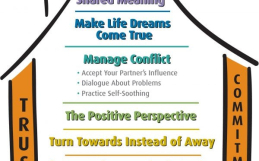Understanding Stonewalling in Couple’s Conflicts
One of the Four Horsemen in relationships, according to Drs. John and Julie Gottman’s research, is stonewalling. The Four Horsemen, which include criticism, contempt, defensiveness, and stonewalling, are communication patterns that predict a relationship’s failure. This post will focus on stonewalling, why it happens and how to prevent it.
Stonewalling is the act of withdrawing from communication and shutting down emotionally during a conflict. It can take many forms, such as tuning out, avoiding eye contact, giving short answers or simply saying nothing. When one partner stonewalls, it leaves the other partner feeling unheard, frustrated and alone, and this can cause significant damage to the health of a relationship.
Drs. Gottmans believe stonewalling often happens when one partner feels emotionally overwhelmed or flooded. This emotional state can cause the individual to shut down, either physically or emotionally, to avoid further conflict. While stonewalling may provide temporary relief from an argument, it only hinders resolution and can cause more serious damage to the relationship.
Drs. Gottmans believe the antidote to stonewalling is physiological self-soothing, which I have addressed extensively in a separate post.
While stonewalling may provide temporary relief from an argument, it only hinders resolution and can cause more serious damage to the relationship.
What can you do to prevent stonewalling in the relationship?
First, you need to spend some time reflecting and understanding the root causes of stonewalling, such as stress, anxiety, or past trauma, and working on managing those underlying issues.
Second, you need to understand the impact of stonewalling on your partner. Partners of people who stonewall during conflicts describe their experience as similar to feeling punished. They feel helpless and think they cannot get in and reconnect with their partner.
Third, you need to work on developing effective communication skills, such as active listening and expressing oneself in a calm and non-threatening manner.
Fourth, you need to work together as a couple to create a safe and supportive environment for communication. This involves you and your partner working on establishing trust and respect and trying to approach conflicts with a collaborative mindset. When you feel safe and supported, it’s easier to stay engaged in the conversation and work towards a resolution.
Fifth, you need to practice self-care and manage stress levels in your relationships. This can involve engaging in activities that bring you peace and joy, such as exercise, meditation, or hobbies. By taking care of yourself and managing stress levels, you are better equipped to handle conflicts in a calm and productive manner.
If you and your partner are struggling to address stonewalling in your relationship, a licensed couple therapist will be able to assist you in understanding underlying issues that may contribute to stonewalling. They can also provide a safe and neutral environment for you and your partner to learn effective communication skills, work through conflicts and improve the overall health of the relationship.
I wish you all the best.




